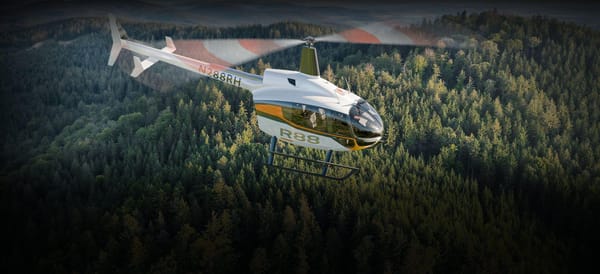Twin Engine vs Single Engine Helicopters: What's the Difference?

If you are looking for a helicopter to buy or rent, you might wonder about the advantages and disadvantages of twin-engine and single-engine helicopters. In this article, we will compare these two types of helicopters and explain what factors you should consider when choosing one.
[wpsm_titlebox title=”Contents” style=”1″][/wpsm_titlebox]
What is a twin engine helicopter?
As the name suggests, a twin engine helicopter has two engines, usually mounted on either side of the main rotor mast. The engines provide power to the main rotor and the tail rotor, which are used to control the helicopter’s lift, thrust, and yaw. Twin engine helicopters are more common in larger and heavier helicopters, such as those used for military, emergency, or commercial purposes.
Examples of twin engine helicopters are Airbus H155, AgustaWestland AW139, Bell 427, and Eurocopter AS365.
What is a single engine helicopter?
A single engine helicopter has only one engine, providing power to both the main rotor and the tail rotor through a transmission system. Single engine helicopters are more common in smaller and lighter helicopters, such as those used for training, recreation, or personal use.
Examples of single engine helicopters are Bell 407, Airbus Eurocopter 120, Airbus Eurocopter EC 130, Robinson R66.
What are the advantages and disadvantages of twin engine helicopters?
Let’s look at the pros and cons of twin engine helicopters.
Advantages of twin engine helicopters
Higher performance: Twin engine helicopters can fly faster, higher, and longer than single engine helicopters. They can also carry more passengers and cargo.
More redundancy: Twin engine helicopters have more backup systems for engine failure or other emergencies. They can usually continue flying with one engine until they reach a safe landing spot.
More safety: Twin engine helicopters are generally safer than single engine helicopters, especially in adverse weather conditions or over hostile terrain. They can also meet stricter regulations and standards for certain operations.
Disadvantages of twin engine helicopters
Higher cost: Twin engine helicopters are more expensive to buy, maintain, and operate than single engine helicopters. They require more fuel, parts, and maintenance.
More complexity: Twin engine helicopters have more systems and components that need to be checked and monitored during flight. They also require more training and skill to fly.
More noise: Twin engine helicopters produce more noise than single engine helicopters, which can be a nuisance for the pilot, passengers, and people on the ground.
What are the advantages and disadvantages of single engine helicopters?
Now let’s have a look at the pros and cons of single engine helicopters.
Advantages of single engine helicopters
Lower cost: Single engine helicopters are cheaper to buy, maintain, and operate than twin engine helicopters. They require less fuel, parts, and maintenance.
Less complexity: Single engine helicopters have fewer systems and components that need to be checked and monitored during flight. They also require less training and skill to fly.
Less noise: Single engine helicopters produce less noise than twin engine helicopters, which can be more comfortable for the pilot, passengers, and people on the ground.
Disadvantages of single engine helicopters
Lower performance: Single engine helicopters can fly slower, lower, and shorter than twin engine helicopters. They can also carry fewer passengers and cargo.
Less redundancy: Single engine helicopters have fewer backup systems in case of an engine failure or other emergency. They usually have to land immediately if they lose power.
Less safety: Single engine helicopters are generally less safe than twin engine helicopters, especially in adverse weather conditions or over hostile terrain. They may not meet certain regulations and standards for certain operations.
How to choose between twin-engine and single-engine helicopters?
There is no definitive answer to which type of helicopter is better or worse. It depends on your needs, preferences, and budget. Some factors you should consider when choosing between twin engine and single engine helicopters are:
- Performance: How fast, high, and far do you need to fly? How many passengers and cargo do you need to carry?
- Redundancy: How important is it to have backup systems in case of an emergency? How often do you fly over challenging terrain or weather?
- Safety: How much risk are you willing to take? How strict are the regulations and standards for your operation?
- Cost: How much money are you willing to spend on buying, maintaining, and operating your helicopter? How much fuel do you need to use?
- Complexity: How comfortable are you with flying complex systems and components? How much training and skill do you have or need?
- Noise: How sensitive are you to noise levels? How much do you care about the impact of noise on others?
Final thoughts
Ultimately, the choice between twin engine and single engine helicopters is a personal one that depends on your specific requirements, budget, and goals.
Twin-engine helicopters offer superior performance and redundancy, making them ideal for commercial operations or demanding and challenging environments. On the other hand, single-engine helicopters are more affordable and fuel-efficient, which makes them suitable for lighter applications and private use.
When choosing a helicopter, it is essential to consider the factors that matter most to you and consult with experienced professionals to ensure you make the best decision for your needs.





